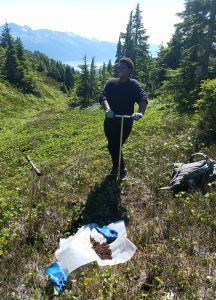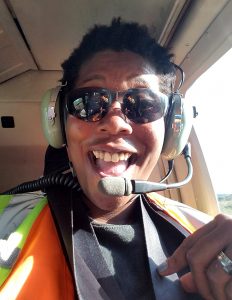
Elizabeth Freeman, who graduated from Wright State with a bachelor’s degree in earth and environmental sciences in 2015, now works as a geologist looking for gold at an underground mine in Alaska.
She struck gold in her career following graduation from Wright State University — real gold.
Elizabeth Freeman is a geologist looking for gold at an underground mine in Alaska.
Shortly after graduating with a bachelor’s degree in earth and environmental sciences in 2015, Freeman worked as a substitute science teacher at Summit Academy in Dayton and then a contracted teacher for a year.
In 2016, she moved to Alaska with her wife to pursue her geology career, landing a job as a core logger at the Kensington gold mine about 45 miles north-northwest of Juneau.
The United States is the world’s fourth-largest gold producer, behind Peru, South Africa and Russia.
The Kensington mine is accessed by a horizontal tunnel and utilizes conventional and mechanized underground mining methods. Ore is processed in a flotation mill that produces a concentrate that is sold to smelters.
Freeman’s duties include logging, collating and interpreting geologic data, helping with geologic surface and underground mine face mapping, and doing geochemical sampling of rock and soil. She also serves as a liaison to drilling contractors and updates the company’s geology department daily on the status of core samples.
“During a typical day, I spend 12 hours in my core shack analyzing my core, which includes recording mineralization and veining content and of course looking for gold,” she said. “Once my current project is finished, I pick another hole based on priority and I start again.”
Freeman said Wright State and the faculty in the College of Science and Mathematics prepared her to be successful by showing her she could persevere through anything.
“I am eternally grateful to my geology professors and my awesome academic adviser for always supporting my journey,” she said.
As a young girl, Freeman would carve up creekbeds looking for fossils. While her mother was studying at Wright State, 7-year-old Elizabeth would visit campus classrooms and offices to look at fossil fish or spend time in the library reading about geology and archaeology.

Elizabeth Freeman’s college career at Wright State was interrupted and she spent three years working to save money before returning. “My path was a long and arduous one, but I feel like I am finally achieving the goals I set out for myself all those years ago.”
In the ensuing years, Freeman continued to inhale geology. She went on nature hikes and digs. She visited science museums. There was a trip to the Everglades and Yellowstone National Park, where she took a peek into the Earth’s interior.
Freeman’s college career was interrupted when she contracted mononucleosis and was forced to drop out. For three years, she worked to save money to finish college and then returned.
“She was wiser, with more self-confidence and determination that nothing would stand in her way of becoming a geologist,” said her mother, Olivia, who served as a surgeon’s assistant in the U.S. Army.
Freeman says she is thankful for the education and support she received at Wright State.
“My path was a long and arduous one, but I feel like I am finally achieving the goals that I set out for myself all those years ago,” she said. “I want to remind students that they should never give up on themselves or their dreams because one day they will materialize into reality.”

 Wright State alum Lindsay Aitchison fulfills childhood space-agency dream
Wright State alum Lindsay Aitchison fulfills childhood space-agency dream  Wright State business professor, alumnus honored by regional technology organizations
Wright State business professor, alumnus honored by regional technology organizations  Wright State University Foundation awards 11 Students First Fund projects
Wright State University Foundation awards 11 Students First Fund projects  Gov. DeWine reappoints Board Treasurer Beth Ferris and names student Ella Vaught to Wright State Board of Trustees
Gov. DeWine reappoints Board Treasurer Beth Ferris and names student Ella Vaught to Wright State Board of Trustees  Joe Gruenberg’s 40-Year support for Wright State celebrated with Honorary Alumnus Award
Joe Gruenberg’s 40-Year support for Wright State celebrated with Honorary Alumnus Award 